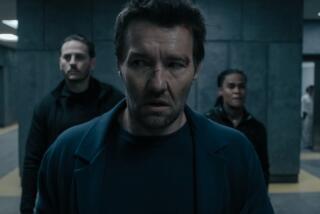‘A Dark Matter: A Novel’ by Peter Straub
- Share via
Peter Straub’s “A Dark Matter” is constructed like a set of nesting dolls. Yet, each layer opens to reveal a doll in fact larger than the one that contained it, unfolding new details about an occult ritual that distorts the lives of the four high school students who participated in it -- and the one who did not, the story’s narrator Lee Harwell.
Built around Lee’s midlife quest for the truth, the story describes his interviews with the ceremony’s survivors, circling back to its consequences for his wife, Lee Truax, his high-school sweetheart. Straub’s handling of those consequences is characteristically deft and compelling.
Still, one can’t help wishing he didn’t keep such a heavy hand on the tiller. Take the mirror motif that structures the relationship between Lee and his wife. Lee the narrator resists the charisma of occult guru Spencer Mallon; Lee the girlfriend succumbs. Lee the narrator refuses to participate in Mallon’s ritual; Lee the girlfriend follows him down the rabbit hole with nary a glance in the, well, rearview mirror. Lee the narrator, though sighted, is blind to the nature of the events that envelop him; Lee the wife, though blind, perceives the secret clockwork that drives the world. Fine.
But does his wife also have to go by the inverted nickname the Eel? And must the pair really look nearly identical? Does Straub have to hammer the point home by calling them “the Twins”?
“If she had changed her last [name],” other characters point out, “you’d both be Lee Harwell.”
Straub’s strength as a novelist is that he works sidewise to reality. Like the gothic fiction that inspires him, his worlds abound with coincidence and images of surreal power.
They shimmer with highbrow allusions that distance them from the workaday world. One character’s last name -- Bly -- alludes to the estate in Henry James’ “The Turn of the Screw.” His vision of a godhead brimming with words recalls the opening of the Gospel of John -- “In the beginning was the Word, and the Word was with God, and the Word was God” -- forcing us to grapple with the redemptive power of literature.
In other words, Straub is the kind of writer who can compel you to reevaluate your understanding of why we tell stories even as he parleys, for instance, Cassius Coolidge’s famous paintings of poker-playing dogs into the sublimely absurd menace of creatures in the novel described as “not-dogs.” The reader learns that these beings serve at the whim of a transcendent power for whom humans, when worthy of notice at all, are mere playthings.
This is a terrifying vision of the universe: Its contrast with the redemptive power of the meanings we create in our fictions lends both perspectives more power. If Straub sometimes pushes the symbols that drive his novels too hard, those novels also serve as often-profound primers on the central contradictions of the human condition.
Bailey is the author of several books, including “The Fallen: A Novel.”
More to Read
Sign up for our Book Club newsletter
Get the latest news, events and more from the Los Angeles Times Book Club, and help us get L.A. reading and talking.
You may occasionally receive promotional content from the Los Angeles Times.






